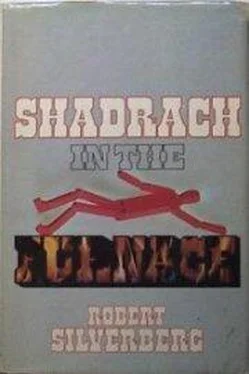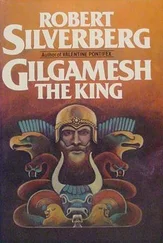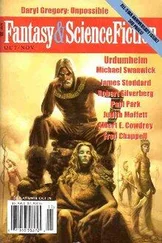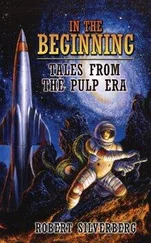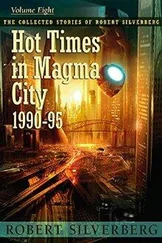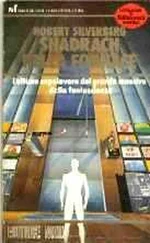The next day is the day of Genghis Mao’s aorta transplant. Shadrach, after the usual brief fitful sleep, awakens, exercises, breakfasts, dresses, negotiates passage through Interface Three, pauses to inspect the doings in the Trauma Ward by means of Surveillance Vector One — the standard morning routine. The dancing lenses display for him the world’s two billion, perhaps twenty percent of them stricken with organ-rot, the walking dead, shambling about with perforations and lesions and corruptions, and most of the others who are still whole living in the shadow of the universal disease, going through a semblance of ordinary life with sullen courage, waiting for the spitting of blood and the fire in the guts, looking toward the demigods of Ulan Bator in envy and bewilderment. While he, light-footed Shadrach Mordecai, the pretty doctor of the Khan, has nothing worse to worry about than being evicted from his own nimble body, being kicked out on his black ass so that a Mongol usurper can move into his skull. Other than that, Shadrach, everything’s fine, right? Right. Yassuh, boss.
Shadrach wonders, as he goes to fetch Genghis Mao for the traditional and familiar gurney ride from the imperial bedchamber to the Surgery, how he will react when he comes face to face with the Khan. Surely his expression will betray his new knowledge; surely Genghis Mao, nearly ninety years canny, will see at once that his designated victim is in on the scheme. But Shadrach discovers that his mysterious tranquility of spirit does not desert him even when he is eye to eye with the Khan. He feels nothing, neither fear nor anger nor resentment: the Chairman is the patient, he is the doctor, the sensors are twitching away, loading him with information, and that’s all, no change in their relation-ship. He looks at Genghis Mao and thinks, You have secretly plotted to steal my body, and there is no effect, none. It remains unreal to him.
“And how am I this morning, Shadrach?” Genghis Mao booms jovially.
“Splendid, sir. Never better.”
“Going to cut out my heart, are you?”
“Only the aorta this time,” Shadrach says. He signals to the attendants. They wheel the Chairman away.
And there they all are once more gathered in the Surgery — the Chairman, the physician, the chief surgeon, the anesthesiologist, the nurses and other miscellaneous medical spear-carriers, everyone scrubbed and gowned and masked, the bright lights gleaming, the transparent aseptic bubble sealed, the filters and pumps pumping and filtering, the computers flashing green and red and yellow like gaudy movie props, the new aortal section — Buckmaster’s? — sitting in its container, fresh and plump, ready to be installed in Genghis Mao’s abdomen.
Warhaftig, confident, serene, prepares once more to open the spare, slight body of Genghis Mao.
“Blood pressure?” he asks.
“Normal,” Shadrach says.
“Respiration?”
“Normal.”
“Platelet count?”
“Normal. Normal. Everything normal.”
Shadrach is aware that if Genghis Mao should die on the operating table, there would be no Project Avatar to menace him: none of the three projects is ready yet to be put into effect, and if the Khan does not survive the transplant, that will be the end of him, without hope of reincarnation, perhaps even the end of the Permanent Revolutionary Committee, the entire fragile society of centripetal depolarization polarizing and centrifuging into chaos the instant the legendary figure of Genghis Mao vanishes from the scene. It would not be hard to manage it. Jostle Warhaftig’s elbow, maybe, as he aims the surgical laser at the Chairman’s guts; apologize profusely afterward, but the damage will be done. Or, more subtly, feed the operating team misleading information, cockeyed reports from Genghis Mao’s ostensible interior: they trust Dr. Mordecai, they will follow his data without bothering to check it against the numbers on the scopes and meters, and he could probably cause irreversible injury to the Chairman, fatal oxygen shortage or the like, before Warhaftig realizes what is taking place. And then the apologies, I simply can’t understand why my readings were off so badly. He has no need to worry about a malpractice suit: topple the Khan and the whole fabric comes apart, every man for himself in the aftermath. But he will not. No harm will come to Genghis Mao by way of Shadrach Mordecai today, not even if he knows the Khan intends to activate Project Avatar before next Tuesday. Dr. Mordecai, in peril or not, is nevertheless a doctor, a dedicated doctor, still young and naive enough to take his Hippocratic oath seriously. He was sworn to keep pure and holy both his life and his art. He has vowed to help the sick and to abstain from all intentional wrongdoing and harm. So be it. Shadrach Mordecai, MD, Harvard ’01, is no traducer of sacred trusts. Genghis Mao is his patient; Genghis Mao will not die at Shadrach Mordecai’s hands this day. Perhaps this is foolishness, but there is also a certain grace in it.
The operation proceeds smoothly. Snip, and the weakened section of Genghis Mao’s aorta comes out. Stitch stitch, and the replacement is grafted in. Heart-lung machines keep the circulation bubbling. The Khan watches, conscious and beady-eyed, through the whole thing, now and again nodding to himself as Warhaftig executes some particularly admirable veronicas and entrechats and passades. He seems to know what is going on; he has spent more time observing surgeons at their trade than I have, Shadrach realizes, and can probably do the job pretty well by himself by now. Warhaftig’s elegant fingers elegantly close the incision. The tissues are raw and reddening, having been cut into for the liver transplant less than two weeks earlier, and this calls for some special prophylactic measures, but the surgeon brings everything off with his customary finesse. Genghis Mao grins approval when all is over. “Good show,” he tells Warhaftig. “Two ears and the tail!”
Shadrach makes off with the Khan’s discarded abdominal aorta. He tells Warhaftig, not that Warhaftig cares, that he intends to run some tests on it, but what tests would tell him anything about this drooping length of ancient tissue, this tired hose, that he doesn’t already know? He covets it because it’s an authentic piece of the body of the authentic Genghis II Mao IV Khan, and Shadrach has the collector’s itch: this will be an ornament to his little museum of medical memorabilia. A relic of one of history’s most famous patients. There is a tale Shadrach knows, probably apocryphal, of how the doctor who performed the autopsy on Napoleon removed the imperial penis and kept it as a souvenir of the late emperor, bequeathing it to a fellow physician who ultimately sold it at an immense price, and so on and on, passing from one doctor’s collection to another, until it disappeared altogether during the confusions of some twentieth-century war. Similar stories, he knows, have been told of odd scraps of Hitler, Stalin, George Washington, Catherine the Great. Shadrach regrets that he attained his present post too late to collect some of the really significant organs of Genghis Mao — a kidney, say, or a lung, the liver, the pancreas — but all of them were gone long before Shadrach’s time, the native organs of the Khan’s body removed and replaced, sometimes several times over, with transplanted substitutes. Shadrach does not see much value in preserving Genghis Mao’s fourth liver in his collection, his eighth spleen, his thirteenth kidney, though he recognizes that these temporary residents of the Khan are more intimate artifacts of Genghis Mao than, say, his bedroom slippers or his wristwatch. But he prefers the genuine somatoplasm, and a piece of authentic aorta is the best he can do just now.
There’s the aneurysm, big and ripe, ready to pop. Another few days and it might have ruptured, poof! and no more Genghis Mao. The Chairman and Mangu might have shared the same funeral, come Saturday, if Shadrach hadn’t felt odd twitterings in the circulatory-system sensors and correctly guessed their import. So I have saved the Khan’s life, not for the first time and he is once more restored to perfect health. Fine. Fine. May he live five hundred years, and may I be his physician always!
Читать дальше
